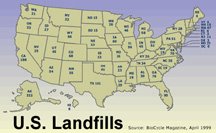Landfill questions deserve answers
The Canton Repository
PIKE TWP - Regional officials are asking the Ohio EPA reasonable questions about independent testing of conditions at landfills. They are due reasonable answers.
When the board of the Stark-Tuscarawas-Wayne Joint Solid Waste Management District met last week, members talked about whether they want the EPA to use data submitted by the Countywide landfill to determine whether Countywide is following environmental laws. Having landfills do their own testing is standard operating procedure in Ohio.
The question would be fair in any case but is especially important in the case of Countywide, the Pike Township landfill that has emitted a sickening stench for a year. Environmental Protection Agency Director Chris Korleski has recommended that the Stark County Board of Health close Countywide if the landfill cannot meet certain requirements.
At the meeting last week, Tuscarawas County Commissioner Kerry Metzger wondered why Ohio’s landfills can’t be required to use independent labs to collect data on temperature, dangerous gases, liquid waste and other factors. Bill Skowronski of EPA’s office in Twinsburg said cost would be a concern. He compared it to the Internal Revenue Service’s auditing every tax return. The board needs an answer, not a ludicrous comparison (200 million-plus tax returns vs. 41 licensed solid-waste landfills in Ohio). And the cost issue raises a second reasonable question: Would anything prohibit EPA from billing landfills for independent testing, as Wayne County Commissioner Cheryl Noah suggested?
The question of whether EPA should use Countywide’s data was being asked within the agency itself last summer. The question should still be alive there: EPA accepted Countywide’s conclusion that a chemical reaction was causing the heat underground, only to be told by a California expert last month that fires were the problem.
Metzger, Noah and other board members should keep asking these questions. The answers are important to Stark County but also to other counties where landfills operate.
PIKE TWP - Regional officials are asking the Ohio EPA reasonable questions about independent testing of conditions at landfills. They are due reasonable answers.
When the board of the Stark-Tuscarawas-Wayne Joint Solid Waste Management District met last week, members talked about whether they want the EPA to use data submitted by the Countywide landfill to determine whether Countywide is following environmental laws. Having landfills do their own testing is standard operating procedure in Ohio.
The question would be fair in any case but is especially important in the case of Countywide, the Pike Township landfill that has emitted a sickening stench for a year. Environmental Protection Agency Director Chris Korleski has recommended that the Stark County Board of Health close Countywide if the landfill cannot meet certain requirements.
At the meeting last week, Tuscarawas County Commissioner Kerry Metzger wondered why Ohio’s landfills can’t be required to use independent labs to collect data on temperature, dangerous gases, liquid waste and other factors. Bill Skowronski of EPA’s office in Twinsburg said cost would be a concern. He compared it to the Internal Revenue Service’s auditing every tax return. The board needs an answer, not a ludicrous comparison (200 million-plus tax returns vs. 41 licensed solid-waste landfills in Ohio). And the cost issue raises a second reasonable question: Would anything prohibit EPA from billing landfills for independent testing, as Wayne County Commissioner Cheryl Noah suggested?
The question of whether EPA should use Countywide’s data was being asked within the agency itself last summer. The question should still be alive there: EPA accepted Countywide’s conclusion that a chemical reaction was causing the heat underground, only to be told by a California expert last month that fires were the problem.
Metzger, Noah and other board members should keep asking these questions. The answers are important to Stark County but also to other counties where landfills operate.













